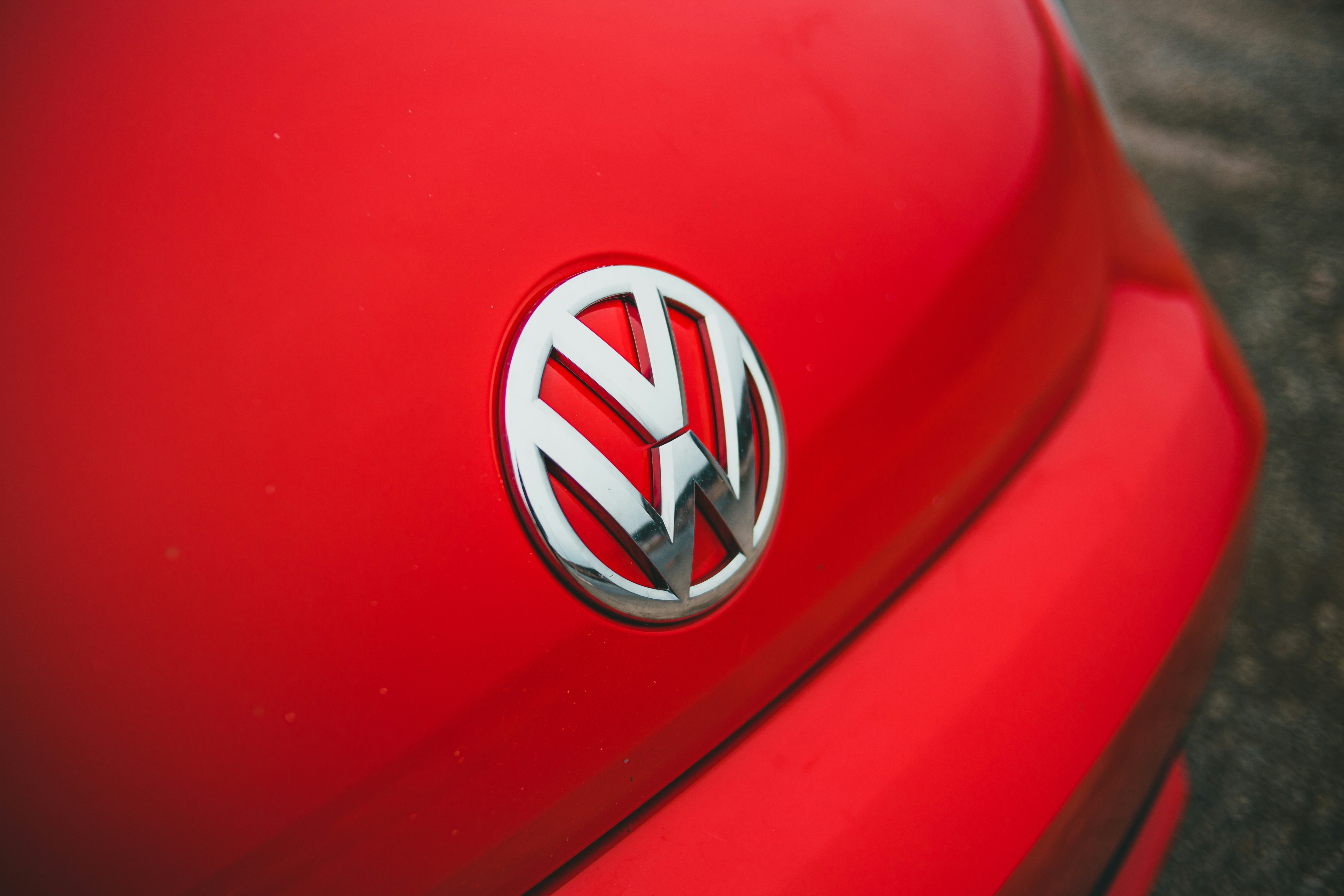The best pencils for artists, including options for colouring, drawing and sketching
The best pencils include mechanical, watercolour, pastel and colouring options for artists and illustrators.
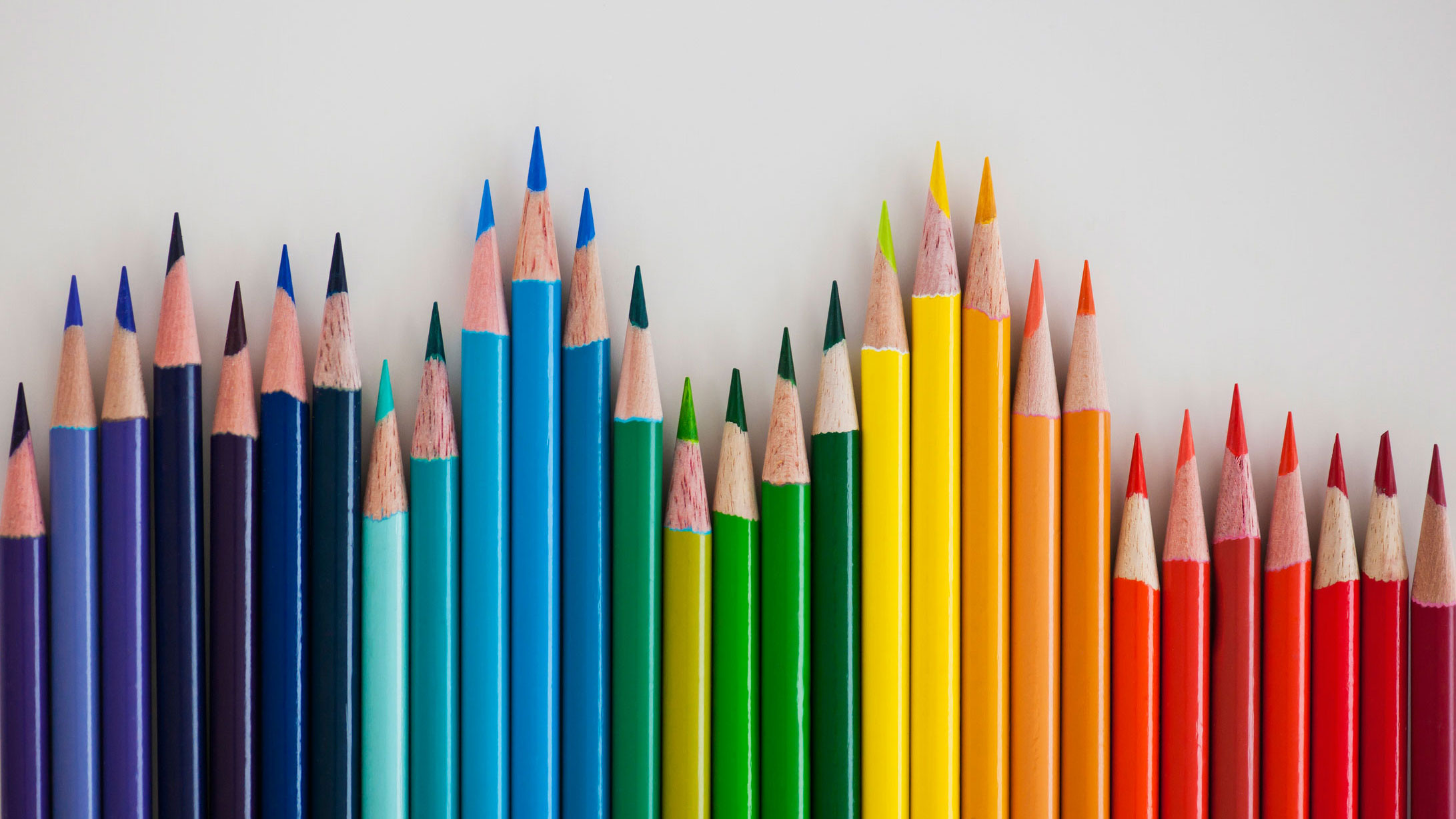
The best pencils for artists can help your work shine – and can help you work more comfortably too. There are thousands of different pencils out there, so it can be tricky to whittle down your options, but in the guide below, we compare the best pencils of different categories to help you choose.
Our reviewers have tested out the best pencils for a range of creative tasks, including the best pencils for drawing, watercolour, colouring and pastels. We tried out the pencils for a range of tasks, paying attention to colour range, blending, lightfastness (whether they fade in light) and overall quality and feel. We've included options for both professionals and hobbyists, evaluating each pencil on value as well as quality, performance and durability.
For inspiration, see our essential guide to pencil drawing techniques and our pick of the most realistic pencil drawings. And if you want more art supplies, see our best oil pastels and best markers roundups.
The best pencils for drawing and sketching
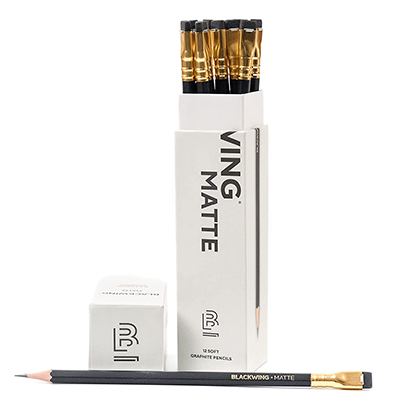
+ Smooth to use
+ Quality materials
Palomino Blackwing pencils have wax added to them, making them super-smooth to use, and they create velvety dark marks. We gave them five stars in our Palomino Blackwing pencils review. A pack of 12 also offers good value for such fine-quality pencils, making these our best pencils for drawing overall.
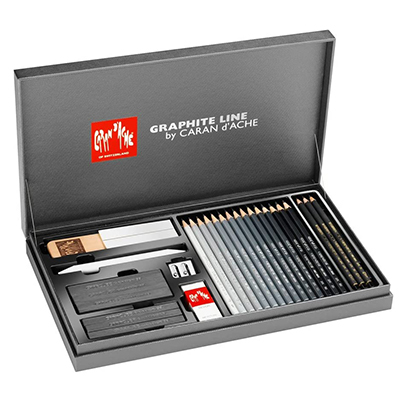
+ Exceptional quality
+ Range of effects
If you want to treat someone (or yourself), the Caran D'ache Graphite Line gift box is truly a thing of beauty. It's very pricy for 20 pencils, plus graphite sticks and accessories, but the quality is exceptional, having been refined to perfection. They deliver thick and thin lines, gradation, flat-wash, blurring and watercolour effects.
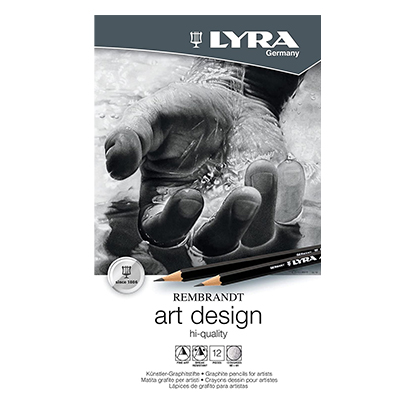
+ 17 grades
+ Pure cedar wood
For a much more economical option, these hexagonal design pencils are ideal for honing shading skills. The full range covers 17 grades from 9B to 6H, but smaller selections feature a good, representative sample. These are encased in pure cedar wood and boast ultra-fine graphite lead suitable for more rigid technical drawing techniques.
The best pencils for colouring
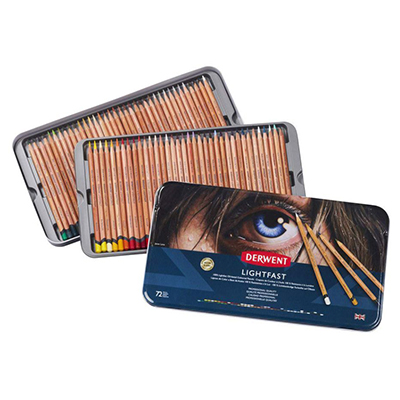
+ Intense colours
+ Layerable and buildable
The first oil-based range of pencils from Derwent, these offer super-intense but flexible colours – how firmly you press makes a huge difference in how they show. Derwent has taken the lightfast element very seriously for colour that can stay for up to 100 years in museum conditions. The pencils layer beautifully, and their maple casing looks and feels great.
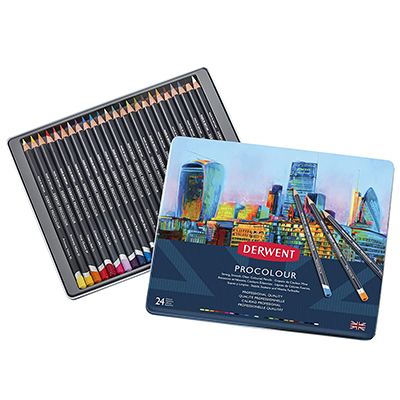
+ Blend well
+ Sharpen nicely
Another selection from the same reliable brand, the Procolour range came out in 2017. The pencils feel substantial, with a sturdy circular shaft, and the leads aren't too waxy or too brittle. They boast a high pigment level, which makes for wonderful colour gradation, even with a light touch. We gave them four and a half stars in our Derwent Procolour review.
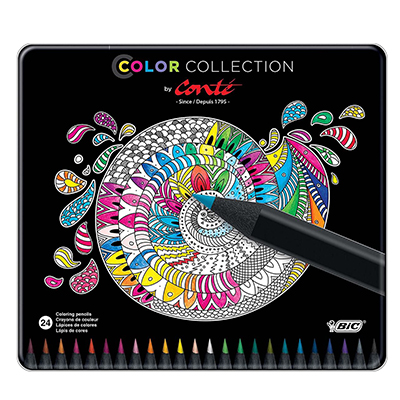
+ Splinter-free
+ Very affordable
We think these are the best pencils for colouring on a budget. They're made of synthetic resin rather than wood, so they're splinter-free if they break. A 3.2mm pigment-based lead provides smooth, even and consistent coverage for artists of all types, and you can get them in sets of 12 or 24. The colour intensity isn't as strong as more expensive sets, but they're great value.
The best mechanical drawing pencils
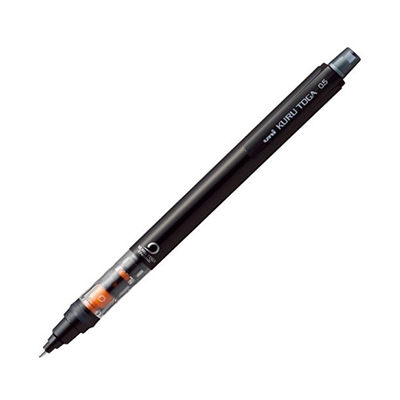
+ Consistent lines
+ Low risk of breakage
The design of mechanical pencils hasn’t seen a massive of progression in recent years, but Uniball Kurutoga Pipe Slide takes a leap forward with a spring-loaded clutch that incrementally twists the graphite as you write. This means the lead wears in a uniform way, staying pointed so that the beautifully thin line remains consistent.
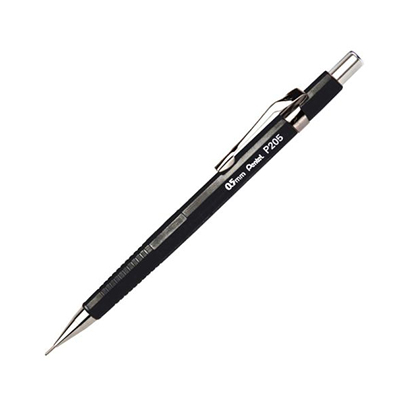
+ Great price
+ Good all-rounder
We think this is the best pencil for those that want a budget mechanical option. These pencils might not boast any clever features, but they're nice to hold and draw with, and a pack of four is great value. With a plastic barrel, ribbed finger grip and removable metal pocket clip, these make good pencils for professional drafting, too.
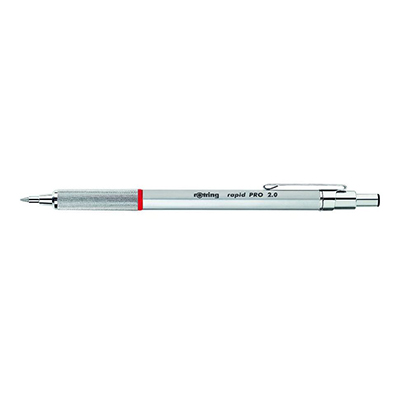
+ Clip and eraser included
+ Cross-hatch grip
This beautiful metal drafting pencil is without a doubt one of the best pencils for pros. It has a full metal hexagonal body designed to balance its weight and a circular cross-hatch metal grip. The cushion point mechanism allows the sliding sleeve to give slightly under pressure, reducing the risk of the lead breaking.
The best watercolour pencils
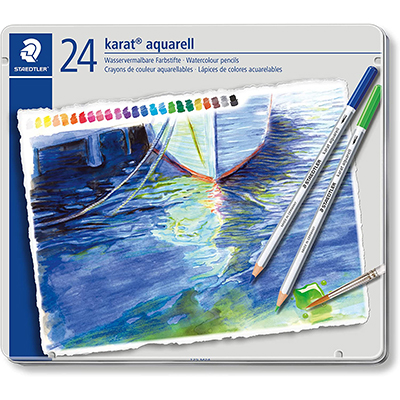
+ Can be used dry or wet
+ High pigment content
Coming in sets of 12, 24, 36 and 48, these are our pick of the best pencils for watercolour work. They have high-pigment, break-resistant leads and a quality wooden shaft that sharpens well. Of course, you can use them dry, but you can add water for extra fun. We gave these five stars in our Staedtler watercolour pencil review.
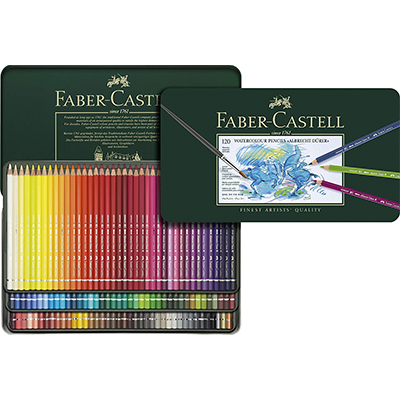
+ High-quality materials
+ Can be used dry or wet
These excellent watercolour pencils boldly claim to offer over 100 years of fade resistance, and they're made from the highest quality materials, including vibrant pigments and a unique binder medium. They're perfect for both drawing and painting techniques and come in tins from 12 to 120.
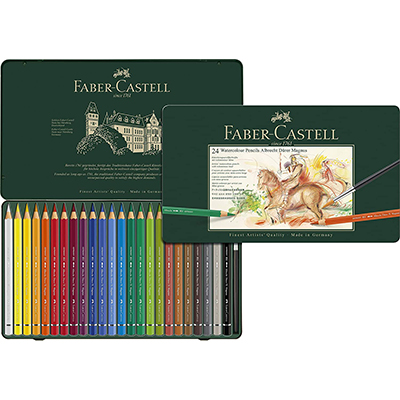
+ Soft laydown
+ Brush included
If you want to work on a large canvas, these bigger, chunkier vibrant pencils from the same brand may be the best pencils for you. The 5.3mm leads allow large areas to be covered quickly and easily, and their size and shape is easier on the wrist too. They come in tins of 12 or 24, and they come with a 10mm paintbrush.
The best pastel pencils
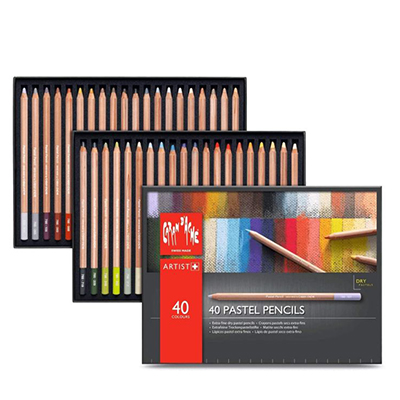
+ Good lightfastness
+ Smooth texture
These are pricy, but they're richly pigmented and almost all 84 have high lightfastness ratings. The texture is smooth as it goes down, and it leaves dense colour. They feel harder than a soft pastel, and the core is quite thick. The hexagonal barrel is a perk, and the wood is smooth and easy to cut with a blade.
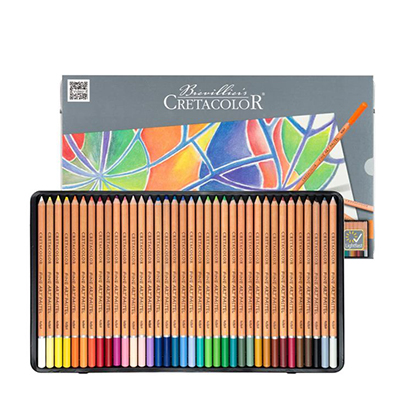
+ Easy to sharpen
+ Good for fine lines
These pencils have a smooth, chalky feel more on the firmer side, which makes them easy to sharpen to a good point, and they keep a point. This makes them one of the best pencils among pastels for fine lines. Colour intensity is fantastic, going down densely. They tend not to blend so easily as other pastels, though they transfer well.

+ Bright colours
+ Good blending
Koh-I-Noor’s are among the softest pastel pencils our reviewers have used. They're bright and blend readily, though there is some loss of intensity when blending. For the price, the colour is surprisingly intense and most are lightfast. The casing is good quality and easy to sharpen. We found these to be suitable for beginners and professionals alike.
How to choose the best pencils
When you're weighing up the best pencils, there are several things to take into account. First, think about your level, are you more of a beginner, intermediate or a pro user? This will dictate which pencils you get, as beginners won't want to waste money on expensive pencils they will only use rarely and pros won't want cheaper pencils that won't last as long. You'll also want to think about what you're going to be using your pencils for, are they for sketching, drawing or colouring? Pencils are created with different use cases in mind so this will dictate the type of pencil you choose.
You'll also want to consider price, how much are you willing to spend on a box of pencils? These considerations will tie in to how big a box you want, could you get by with a smaller set of pencils, or just one mechanical pencil, or do you want more colours and therefore a bigger set?
Other things to take into account are the brand – you'll want to choose a brand with a good reputation like the ones above – as well as colour range, blending and lightfastness (whether they fade with light exposure). Comfort is also important, we've chosen pencils that our artists have tried and know are comfortable but it's worth looking at reviews too. The other thing to think about is durability, more expensive pencils tend to sharpen better and will therefore last longer.
How we test the best pencils
To test the best pencils our reviewers have tested them in a variety of situations, creating a range of marks and using them in a range of projects. They have looked at how easy and comfortable they are to make marks with, how easy they are to sharpen, as well as how work created with them reacts to light. Where applicable, they have also tried blending them with other pencils and mediums to see how well they fare. They've also examined the hardness of each pencil and considered pigment and colour range in their reviews.
FAQ
Which type of pencil is best for drawing?
There are lots of different types of pencil. A HB pencil is the one that most people will be familiar with and use as a child for writing. It can also be used by artists for writing and sketching. 2B pencils can also be used for sketching and as they are softer, can also work well for shading. Other common grades use for sketching include 6-2B, B, F, H and 2-4H. It's useful to have a range of different pencils to work with so that you can make lighter, finer and also darker and harder marks.
Also good for sketching and drawing are graphite pencils, and some people like mechanical pencils, as they are generally good for creating fine lines.
Our top pencils are Palomino's Blackwing pencils, which are pricey but beautiful to use. We also like Caran D-ache's Graphite Line set of pencils and Lyra Rembrand Art pencils.
For more on pencils, see our dedicated guides to the best mechanical pencils, the best coloured pencils, the best watercolour pencils and the best pastel pencils.
Get the Creative Bloq Newsletter
Daily design news, reviews, how-tos and more, as picked by the editors.

Rosie Hilder is Creative Bloq's Deputy Editor. After beginning her career in journalism in Argentina – where she worked as Deputy Editor of Time Out Buenos Aires – she moved back to the UK and joined Future Plc in 2016. Since then, she's worked as Operations Editor on magazines including Computer Arts, 3D World and Paint & Draw and Mac|Life. In 2018, she joined Creative Bloq, where she now assists with the daily management of the site, including growing the site's reach, getting involved in events, such as judging the Brand Impact Awards, and helping make sure our content serves the reader as best it can.
- Georgia CogganEditor
